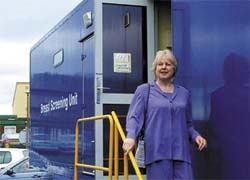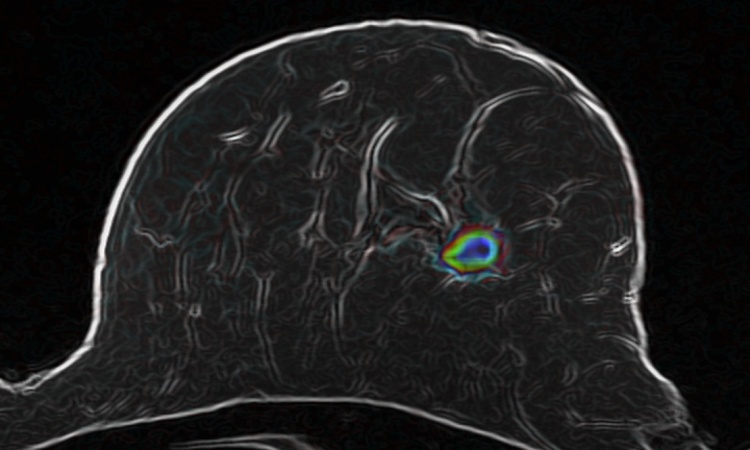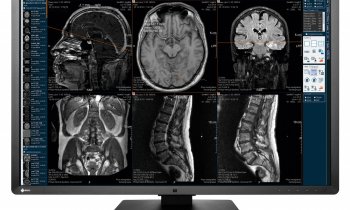United Kingdom
Text messages remind women about appointments.
Brenda Marsh reports on the country's flourishing and expanding breast screening programme

The use of telecommunications by the National Health Service (NHS) continues, and another small development is set to improve the breast screening service.
Because 82% of the UK’s adult population own a mobile phone, and text messaging has been proved to be an effective way of communicating with patients, the Tower Hamlets Primary Care Trust, London, has partnered with iPLATO, which specialises in mobile health promotion. Under the scheme, supported by the Public Health Team, twenty general practitioner (GP) surgeries will use the iPLATO patient care messaging system to send text messages that will remind patients in good time about their breast screening appointments. ‘We have chosen to test whether text messaging can help promote breast screening and the iPLATO platform has demonstrated success in other areas of public health,’ explained Ian Basnett, director of the Public Health Team.
If women want to use this free reminder service all they need do is give their mobile phone numbers to their GP’s surgery.
The NHS Breast Screening Programme was set up by the Department of Health in 1988 in response to the recommendations in a Breast Cancer Screening report published in 1986. This British programme became the first of its kind worldwide to invite women for screening. Progress by date:
l 1991 – A report by the Department of Health Advisory Committee suggested that the programme would save 1,250 lives annually by 2010.
l Mid-90s — National breast screening coverage was achieved.
l 1995 – The programme was commended as a ‘model service’ in the Health Select Committee’s third report into breast cancer services.
l 2000 – Research proved that the screening programme had lowered mortality rates from breast cancer in the 55-69 age group.
l 2000 - The publication of The NHS Cancer Plan in 2000, led to expansion of the NHS Breast Screening Programme, to include women up to and including those aged 70.
l 2006 – Up to March of this year, figures showed that 75.9% of women aged 53-64 resident in England had been screened at least once in the previous three years.
l 2005-2006 — More cancers were detected in this period than in any previous year, 13% more than in 2004-05, 62% above those of 2000-01 and 143% more than a decade ago. Over 13,500 cases of cancer were diagnosed in women screened aged 45 and over, of which 8,824 were diagnosed in the target age group, 50-64.
l 2007 – In September, a new Cancer Reform Strategy has proposed that, to improve cancer care, there will be increased access, reducing waiting times and expanded screening for breast and bowel cancer. Appointments with specialists will be guaranteed within two weeks of referral for all patients with breast problems and not only those with suspected cancer. In addition, the 62-day referral-to-treatment guarantee is to be expanded, enabling hospital specialists and screening centres to ‘fast track’ patients. The age range of women eligible for breast screening will, over time, be increased to ages 47 to 73. An additional 200,000 women will be screened annually.
To date the UK breast screening programme has screened over 19 million women and detected c. 117,000 cancers. The latest research shows that the NHS Breast Screening Programme now saves some 1,400 lives annually in England alone.
The NHS Breast Screening Programme is nationally coordinated. It sets national standards that are monitored through a national quality assurance network. England has a national co-ordination office in Sheffield and an advisory committee that oversees the programme and reports to government ministers.
The service provides free breast screening every three years for all women aged 50 and over. Today around one-and-a-half million women are screened in this country annually. Women aged 50-70 years are now routinely invited. As this is a rotating service between GP practices, not all women are invited as soon as they become 50-year-olds. However, the first invitation is received before aged 53. (Women under 50 are not usually invited for routine screening, because mammograms are not as effective in pre-menopausal women, due to breast density. However, those at risk, or those concerned about a specific breast problem can request NHS screening).
Today, the UK has about 80 breast screening units, each inviting a defined population of eligible women (aged 50 to 70) through their GP practices. Women are invited to a specialised screening unit, which can be hospital based, in a mobile unit, or permanently based in another convenient location, e.g. a shopping centre.
Two views of the breast are obtained - craniocaudal (from top) and mediolateral (into the armpit diagonally across the breast. According to research, this increases small cancer detection rates by up to 43%.
In England, the budget for the breast screening programme is now estimated to be £75 million — about £37.50 per woman invited, or £45.50 per woman screened.
31.12.2007











